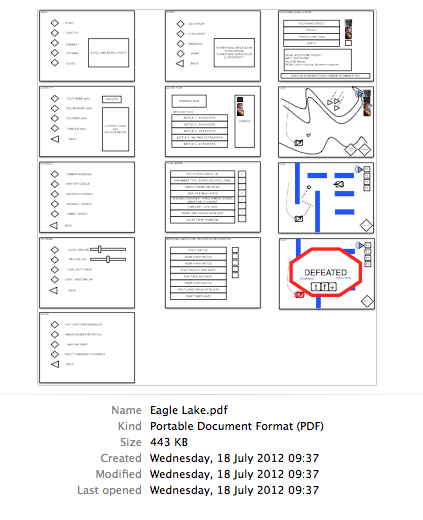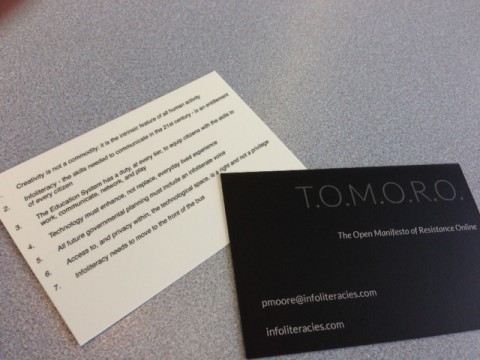Last week, I spent 4 days at the CultureTECH Festival in Derry/Londonderry. I spent the majority of the days helping local game companies showcase their work. Special thanks to Black Market Games, ZombieSaurus Games, Troll Inc, Cube Noir and BatCat Games for putting together their demos and attending the event. I didn’t get to many … Continue reading “cultureTECH: What I did…”
Last week, I spent 4 days at the CultureTECH Festival in Derry/Londonderry. I spent the majority of the days helping local game companies showcase their work.
Special thanks to Black Market Games, ZombieSaurus Games, Troll Inc, Cube Noir and BatCat Games for putting together their demos and attending the event.
I didn’t get to many of the events which were on all day and every day (just due to working on the stand). I did manage to get to (and thoroughly enjoyed)
- Bright Club “Digital Love”
- The Japanese Popstars
- The Hubb.it Launch
- NIScreen “Games on Film” briefing
I’ll write a little about Bright Club another time.
I’m kicking myself for missing Tim’s talk but my friend @mmarymckenna covered it well in her blog post “10 things crowdfunding investors want most from digital media investments“.
As I wasn’t there, I can’t verify but this seems to be a lit of things “investors” want out of a digital investment. It doesn’t seem to be specific to “crowdfunding investors” (especially because, at the moment, when you participate in a crowdfund, it’s not investment, it’s pre-purchase or donation – but I digress).
I think every quality mentioned in the blog post describes investments in every tech-related company but it leaves us with some difficult issues. I had a brief conversation with Tim just after the SeedComp judging and touched on some of these.
Business Model
Many media companies in the “hit” business are going to find this difficult to describe. Recent darlings in the media include:
- OMGPOP – $16.6M investment since 2007, acquired by Zynga for $200M.They developed around 46 games before Draw Something, which resulted in their aqui-hire.
- Rovio Entertainment – angel investment in 2005, $42M Series A investment in 2011. Current revenues of €74M. And 32 games listed as developed before 2009 (when they released Angry Birds)
- MOJANG – founded in 2009, boostrapped and by March 2012, the company had accumulated a net income of over $80 million
The point being that all of these companies toiled for years before having their overnight success. Many of our hit-driven companies tend to focus on one property and then attempt to court investors on the strength of that one property. But an equity investment is not about the strength of the property, it’s an investment in the company and therefore you may have to detail how you will defeat risk by iterating on titles and making multiple products. Explain to them you are not looking for a one-hit wonder.
And good luck explaining this to our local Regional Development Agency.
Location
If location is a big deal, then you’re fucked if you stay in Northern Ireland. Our local investment funds are conservative, ignorant and, for the most part, tapped out. There’s no way you could get a $42M Series A here. OMGPOP managed a $1.5M Series A after Angel funding, followed by a $5M Series B a year later. If you want anything of that scale (and to fulfil the business model of rapid iteration, you will need large amounts of funding), you will need to go elsewhere. That’s if Location is as important as they say. For crowdfunding, I don’t think it is.
There’s more in the blog post so pop on over and have a read. I just don’t think that any investors in Northern Ireland appreciate the difficulties for creating a real media business in Northern Ireland.this also means they do not appreciate the opportunity.
You will spend a lot of time doing work for other people.
While you may love your idea and have a list of ideas as long as your arm, you will end up doing a lot of “agency” work as you use your finely crafted skills to make games for other people. This will distract you from your mission as you end up crafting games where your eye and expertise are not the deciding factor. This will provide you with much-needed liquidity – enabling your team to afford luxuries such as food and power. I admire the teams of people able to make games while living on 11p Ramen while sleeping on floors but that’s an occupation for the young. It’s not something that my wife and kids would be able to stomach. If you are like that, then try and reconcile your ambition with the Francis Ford Coppola model.
Games are for kids
And it doesn’t matter how much you try to explain this to investors, they don’t play games. For the most part they got a trade in their youth (involving the lifting of bricks or other housing materials) and games were the things they bought for their children. Unless you mean the slot machines in Newcastle on a rainy summer day. The idea that the average age of gamers is creeping up and the average personal income of gamers is skyrocketing is beyond them. They don’t play games. They don’t buy games.
Property investors don’t understand digital
If you build a house for £50,000, you sell the house for £200,000, you get £150,000. If you build a game for £1,000,000, you sell the game for £13.99 and you get a massive loss. The idea that you have to sell a million copies is utterly alien to them. But you will have to explain to people who do not play games, how you’re going to sell a million copies of your game to people. And I shudder at the thought of trying to explain Free-To-Play.
Investors want sold quick returns
You have to explain how long it’s going to take to make back the investment. And there is every chance that your first five games will not make back that investment. So extend your runway. There is no reason you cannot be as good as MOJANG or OMGPOP or Rovio. So measure your successes in years, not months. You have to be prepared for the long haul. You have to prepare your investors too.
Listen to your customers
Just as local investors do not understand you, your market or your product, your target customers absolutely do. You don’t have to implement every crazy ides they have (the Easter-themed mod might not make the final cut) but customers are all potential fans who will help you get to your returns. They’re the oil for the engine that will accelerate you to getting 1000 True Fans..
Get on with it
We are following the Coppola model in Conquest Dynamics. Everyone in the team has their day job, everyone has family and responsibilities. The current team (John, Aidan and myself) started working on this in mid July and we were able to demo at CultureTECH last week. An incredible amount of work has been done and the (other two) guys are amazing at what they do.
From this rough series of diagrams and icons on the 18th July:

To this working multiplayer demo, in 6 weeks.



